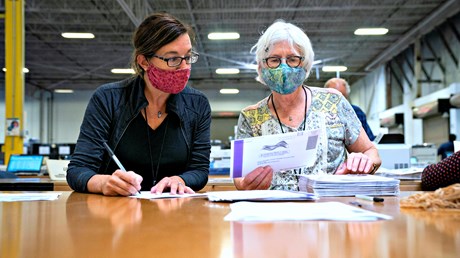Religion and politics researcher Ryan P. Burge suggests how to make sense of the barrage of polls and results.

Though Americans have been voting for weeks, the big day is here.
It’s easy to feel overwhelmed with the sheer volume of information about state-level polls, early-voting tallies, outstanding mailed ballots, and the over 200 lawsuits over voting rights. As a political scientist whose research focuses on religion and politics, I dig through polling data every day and sometimes still feel like I don’t know how I am going to process the results.
This election feels particularly precarious after President Donald Trump’s win took many by surprise in 2016. Some are skeptical about the validity of polling; last presidential election, the national polls were just as accurate as they’ve always been, but the state polls were off. This year, news outlets and analysts are being more cautious.
As we gear up for the results, here are five pointers for making sense of the barrage of information that will come out on election night and beyond.
1. Don’t trust the exit polls.
Exit polls, taken outside voting locations throughout the country, are a fixture of Election Day coverage. Poll administrators pull aside a random selection of people as they are leaving and ask basic questions about themselves and how they voted. Those results are quickly tabulated and are then disseminated throughout the evening on the major news networks.
However, they have never been very reliable, and political scientists hardly ever use them for academic journal articles because of a myriad of issues related to the way they are collected and how they ask questions. For instance, these polls often employ an oversimplified question battery related to religious affiliation that can confuse respondents. Additionally, because exit polls are ...
from Christianity Today Magazine
via

.gif)

.gif)

.gif)
.gif)
